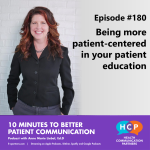Want to be more patient-centered in your patient education? Hear about one …
[Read more...] about Episode 180 Being more patient-centered in your patient education

Want to be more patient-centered in your patient education? Hear about one …
[Read more...] about Episode 180 Being more patient-centered in your patient education

2024 has already been a great year here at HCP. 10 Minutes to Better Patient …
[Read more...] about Catching up with this year’s guest interviews
Lots of research-based resources. No deficit perspectives.
